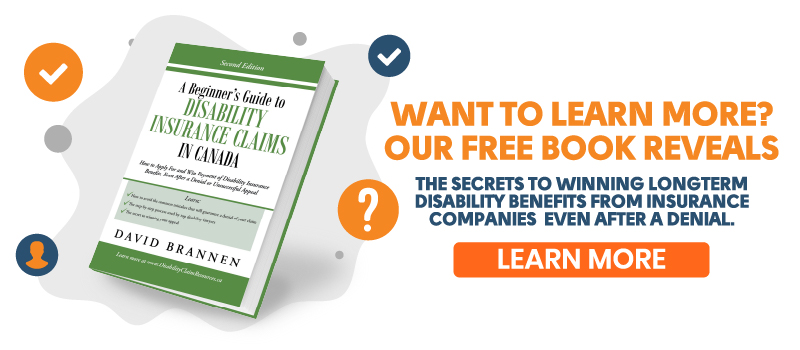The story usually goes something like this. You have been struggling with a disability for several months or maybe years. You are worried about your financial situation or simply don’t want to “give up,” so you don’t apply for long-term disability benefits (LTD). As your condition worsens and your life spins out of control, you start to believe your only option is to reduce your hours and work part-time. However, you fail to consider how this decision will affect your future long-term disability claim. Does this sound familiar? If so, we are here to help.
This article discusses everything you need to know about long-term disability and working part-time. This includes an explanation of how working part-time can affect your ability to get on LTD disability benefits in the future, whether you should even apply for long-term disability if you can work part-time, and if insurance companies allow claimants to work part-time while receiving LTD benefits.
This article is part of our Ultimate Guide to Long-Term Disability.
Should You Apply for Long-Term Disability If You Can Work Reduced Hours?
Many people aren’t aware that the amount you work per week determines if you are eligible for disability insurance coverage. Under most policies, you are required to work a certain number of “minimum hours” per week to be eligible and covered for disability benefits. The number of minimum hours you have to work will depend on your specific insurance policy. However, most require you to work between 25-32 hours in order to stay covered.
If you are thinking about working part-time instead of going on disability benefits, you should get a copy of your benefits booklet. Look for the section entitled, ‘Active at Work Requirements’ or something along those lines, and it should tell the minimum hours you need per week in order to stay covered.
If your policy says you need to work 25 hours, and you truly think you are able to do that, then you should go ahead with working part-time instead of going on disability benefits. That way, you will still be eligible if you ever need to go on long-term disability in the future. However, suppose the policy states you need to work 32 hours in order to stay covered. If you know you can’t physically work that much, then you may be better off applying for long-term disability. This is because if you stay at work and your disability worsens, you will no longer be eligible for disability coverage under your insurance plan.
How to Decide If You Should Go on Disability Benefits or Work Part-Time
This is a huge life decision. So, let’s treat it that way. The following are situations where you should consider working part-time, as well as scenarios where you should go on long-term disability instead.
Situations where it makes sense to work part-time:
- You have read your benefits booklet and have determined that you will 100% be able to work the minimum hours per week in order to stay covered
- Your disability is improving
- Your doctor signed off on part-time work
- You are fine with earning less money as a result of your disability
Situations where you should consider going on long-term disability benefits:
- You don’t think you will be able to work the minimum hours
- Your condition is getting worse
- Your doctor says you should go on disability benefits
- You can’t afford to work on a part-time basis
Can You Work Part-Time While Receiving LTD Benefits?
Now let’s suppose you have decided that you absolutely need to go on long-term disability benefits, but you are dead set on working part-time throughout your claim. You want to know if you can work part-time while receiving long-term disability benefits.
Unfortunately, we can’t give you a straight answer on this as it will depend on your specific insurance policy. But we will do our best to break it down for you.
If you’ve read some of our other articles, you’ll know there are two types of insurance policies. The policy your employer buys: is a group insurance policy, and the one you buy: is an individual insurance policy.
So, why does your type of policy matter here?
Individual insurance policies
The type of policy matters because partial disability payments are very common with individual insurance policies, while they are not as common with group insurance policies.
Individual policies often allow something called partial disability or residual disability, specifically allowing someone to continue their employment and receive a “top-up” of disability payments. In short, this means many individual policies will allow you to work part-time while receiving disability payments.
Group insurance policies
However, things get much more complicated with group insurance policies. All group policies allow for claimants to work part-time in very limited situations. One example of when they will allow for this is when you are doing a return-to-work program. Nearly all group policies will permit people to work part-time and get disability payments during a return-to-work attempt. But the idea is it’s for a limited period of time, and you’re doing a transition back to the workforce.
With that said, most insurance companies don’t like the idea of you receiving disability payments for part-time work for a prolonged period of time. In these situations, they will always argue that if you can work part-time, you can work full-time.
However, depending on the wording of your policy, it may be easier to get the insurance company to agree to this. For example, some group insurance policies are written in a way that allows for the possibility of you working part-time while receiving partial LTD payments. Policies like these will explicitly mention that there’s a gainful income threshold that you may have to meet, and below that, benefits are still payable. So, if you have a policy that mentions something along those lines, it’s easier to argue that you should be able to work part-time and get a top-up from the insurance company. However, most insurance policies don’t explicitly mention a gainful income threshold, and they will actually leave it blank. This means it’s open to debate because the policy doesn’t mention anything about it at all.
Watch out for this clause
More recently, insurance companies have started inserting clauses preventing claimants from working part-time while receiving disability benefits altogether. These clauses list several things that will cause a claimant’s benefits to end. They list things like death and turning 65, and they’ve added this new one that says if you work in any occupation, your benefits will cease.
This very controversial clause may or may not hold up in court. This is because it creates a conflict with your duty as the insured to mitigate loss. This duty comes from a condition found in nearly every insurance policy. It requires the insured to mitigate the loss to prevent further damages. In other words, it is your responsibility as the insured to take reasonable action to avoid further damages or reduce them. So, if you’re able to work but just at a reduced amount, there is an idea and a requirement that you should be able to do so in order to mitigate your losses. These kinds of situations are extremely complicated. Contact a disability lawyer immediately if you are dealing with this type of clause.
Further reading:
Final Thoughts
We hope this article helped you better understand whether you should apply for long-term disability benefits if you can work part-time. If you can take two things away from this article, let it be that you should read your benefits booklet and determine the “minimum hours” you need to work each week to be covered for disability benefits. And two, you should always seek advice from a disability lawyer if you are unsure about anything regarding your present or future claim.
Here at Resolute Legal, we offer free consultations. So, if you have any questions about this article or need advice on your situation, don’t hesitate to reach out. You can schedule a free consultation by clicking on the form at the bottom of the page or by calling (888) 732-0470.
Free Book Offer
To learn more about long-term disability benefits and to start making better decisions today, download a free copy of our book.



